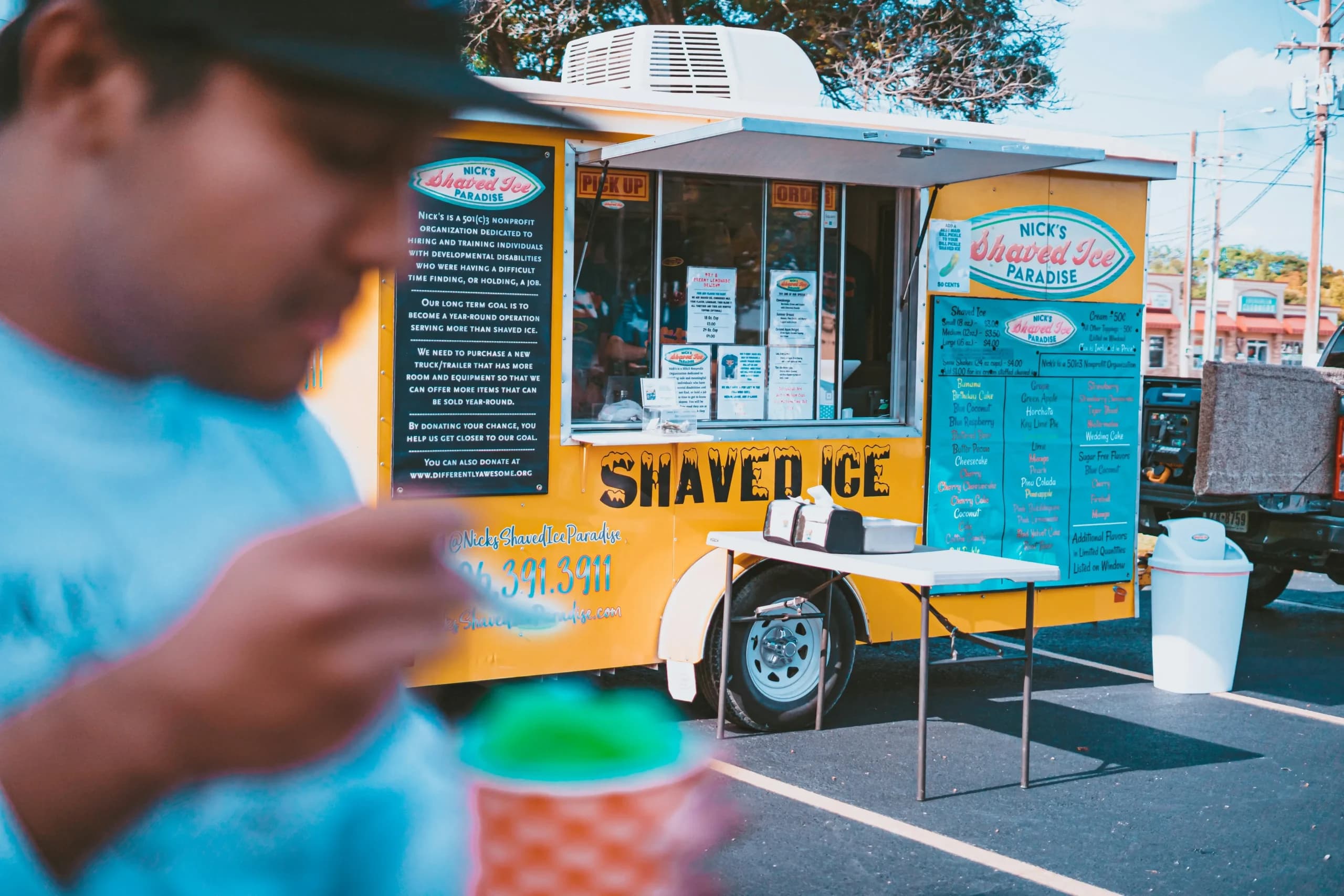Summary
Oregon food truck operators must obtain a business license, plan review, and mobile unit health permit. Each city and county, like Portland, Marion County, or Lane County, sets its own requirements, deadlines, and renewal processes for mobile food businesses.
Key Oregon food truck regulations:
- Oregon business licenses range from $60 to over $100
- County health department approval for food unit plans may take 10 days
- Class I food trucks don’t need a commissary
- Restrooms must be within 500 feet of required food trucks
- Must file a movement notice when moving to another county
Thinking of launching a food truck in Oregon? You’re in good company. Portland alone is home to 500+ food carts, and in 2025, seven local trucks made Yelp’s Top 100 list in the U.S. It’s proof that Oregon’s mobile food scene is thriving.
But turning your dream cart into a real business takes more than great recipes. You’ll need the right food truck licenses, permits, and agreements in place. From health department certifications to local zoning regulations, each document matters to keeping your mobile food unit on solid legal ground.
1. Business license
A business license is the first step in getting your food truck or cart up and running. Each city or county has its own rules, so where you plan to park your mobile food unit matters.
To apply, you’ll need to have your business officially registered as an LLC, sole proprietorship, or other entity. You’ll also need a federal Employer Identification Number (EIN) or Oregon Business Identification Number (BIN), your business name and contact info, and a Certificate of Insurance (COI). Most cities require this document to show that you’re covered in case something goes wrong.
The license fee varies depending on the city or county. In some places, like Portland and Deschutes County, it costs under $100 a year. In larger cities such as Eugene, it could be more. Most business licenses are good for one year and must be renewed annually.
Make sure to apply for your business license early. It’s a gatekeeper for everything else you’ll need to launch.
2. Plan review
A plan review is a prerequisite to the mobile food unit license, and is conducted by the environmental health division in your local county. It covers everything that affects food safety.
You’ll need to submit floor plans or layout drawings that show the inside of your mobile food unit, including where your sinks, coolers, cooking equipment, and prep stations will go. It should also include your food truck equipment list, your full menu, a food flow diagram (how food moves from prep to service), and plans for plumbing and wastewater disposal.
Once submitted, reviews usually take about 10 business days, depending on the county and how complete your documents are. Take note that you can’t build or remodel your food truck until this plan is approved.
3. Mobile food unit license
The mobile food unit license is your main health and safety license, and it’s required statewide. It’s issued by county health departments under the Oregon Health Authority, and you’ll only receive it after passing your plan review and an on-site inspection.
There are four classes of mobile food units in Oregon (Class I through Class IV) based on your setup and menu. Each class has different rules and license fees, which vary by county. Most counties require you to renew this license every year.
If you’re thinking of buying a used food cart or trailer, make sure it still meets current code. Older setups may not pass inspection without costly upgrades.
4. Food handler card
Every employee who handles food in Oregon needs a food handler card. This card proves that your team understands basic food safety and knows how to prevent foodborne illness.
The Oregon Health Authority (OHA) issues food handler cards, and some counties also offer approved courses. It costs $15, and once earned, the card is valid for three years.
As an owner or operator, you should also know about Oregon’s “Person In Charge” (PIC) rule. Every food business is required to have a PIC on-site during all hours of operation. This person must be able to show they understand food safety, how to prevent disease, and the basics of HACCP (Hazard Analysis and Critical Control Points). During inspections, a health officer can test this knowledge at any time.
5. Commissary agreement
You’ll also need a commissary agreement if your food truck or food cart isn’t fully self-contained. A commissary is a licensed commercial kitchen where you can prepare food, wash dishes, and store ingredients or equipment. This agreement is a written contract between your business and the commissary kitchen, and it’s required by the health department if your truck or cart can’t handle all tasks on board.
The requirements vary depending on your unit’s class and the kind of food you serve. If you operate a Class IV unit (which usually has a full menu and uses open flames or fryers), a commissary agreement is almost always required. On the other hand, a Class I unit, which sells only pre-packaged food, may not need one. Always check with your county health authority to be sure.
Most commissary agreements must be renewed every year and included with your license or permit application. Be sure to keep an updated copy on file, as inspectors may ask to see it at any time. If your agreement lapses, you could lose your health permit and be forced to pause operations until it’s fixed.
6. Restroom agreement
If your mobile food unit stays in one spot for long hours or offers customer seating, Oregon law requires a restroom agreement. It makes sure your team has proper facilities nearby, even if your mobile food unit doesn’t have restrooms onboard.
The restroom must be within 500 feet of your unit. The agreement should include your business name and address, the location of the restroom, and proof that it’s open during the same hours your truck is operating.
7. Zoning and parking permits
Before you pick a spot for your food truck or food cart, you need to make sure you’re allowed to operate in the location you’ve chosen. These permits are handled by city or county planning departments, and rules can vary a lot depending on where you are in Oregon.
Aside from checking whether the zone is approved for food trucks or carts, you must also confirm whether you can park on public streets or only on private property. Additionally, take note of distance limits from schools, brick-and-mortar restaurants, and crosswalks as well.
For example, in Portland, you need a special permit from the Bureau of Transportation if you want to operate on a sidewalk or other public space. In Eugene, downtown locations often come with extra costs, like monthly rent or giving a percentage of your sales.
If you plan to park on private property, always get a property owner permission letter. It proves you have the owner’s approval to use the space and can help speed up your permit application process with the city.
9. Notice of mobile unit movement (if operating in multiple counties)
If your mobile food business travels outside the county where it’s licensed, you’ll need to file a notice of mobile unit movement. This rule applies to food trucks, food carts, and any mobile food unit that plans to serve in more than one part of Oregon.
Since food unit licenses are issued at the county level, you must submit a formal movement notice to each new county before you operate there. This lets the local health department know where you’ll be, so they can review your setup and ensure you’re meeting their safety standards.
Some counties charge out-of-county fees, require extra paperwork, or have different health permit requirements you’ll need to follow. If you’re planning events, catering gigs, or weekly stops in different counties, make this step part of your routine.
Oregon food truck licenses checklist
Make sure to keep track of all licenses, permits, and agreements required to run your food truck in Oregon. Use checklists and set reminders to stay on top of expiry dates. It’s best to set reminders at least 30 days before the deadline so that you have enough time to process the renewal.
| Permit or requirement | Who issues it | Renewal timeline | Notes |
| Business license | City or county (varies by location) | Annually | Apply early since it’s needed before most other permits. |
| Plan review | Local environmental health division | One-time (before buildout) | Submit layout, menu, and plumbing plans. Must be approved before you build or operate. |
| Mobile food unit license | County health department (under OHA) | Annually | Required statewide. Fees and rules vary by unit class. |
| Food handler card | OHA or accredited county providers | Every 3 years | Required for anyone handling food. Costs $15. |
| Commissary agreement | Private licensed commercial kitchen | Annually | Required if not fully self-contained. Class IV units almost always need one. |
| Restroom agreement | OHA | Annually | Required if operating long hours or offering seating. The restroom must be within 500 ft. |
| Zoning and parking permits | City or county planning departments | Varies | Required to confirm food trucks/carts are allowed. Public vs private parking rules differ. |
| Notice of mobile unit movement | Health department of destination county | Per move | Needed when operating outside your licensing county. May include inspections or fees. |
On track from day one
Food trucks thrive in Oregon because the state makes it relatively straightforward to get licensed and stay legal, but that doesn’t mean you can skip the details. Every document plays a part in keeping your food cart operational and compliant, from day one to year five.
Once your food truck is licensed and ready to roll, using restaurant scheduling software can help keep day-to-day operations efficient. With 7shifts, you can assign shifts, track time, and communicate with your team all in one app, allowing you to focus more on serving delicious food and less on admin.

Rebecca Hebert, Sales Development Representative
Rebecca Hebert
Sales Development Representative
Rebecca Hebert is a former restaurant industry professional with nearly 20 years of hands-on experience leading teams in fast-paced hospitality environments. Rebecca brings that firsthand knowledge to the tech side of the industry, helping restaurants streamline their operations with purpose-built workforce management solutions. As an active contributor to expansion efforts, she’s passionate about empowering restaurateurs with tools that genuinely support their day-to-day operations.
